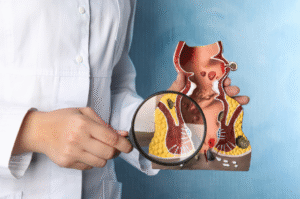Fissure Surgery

Understanding Anal Fissures An anal fissure is a small tear or cut in the lining of the anus, often causing pain, discomfort, bleeding, and difficulty with bowel movements. Fissures can result from various factors, including constipation, diarrhea, straining during bowel movements, inflammatory bowel disease (IBD), or trauma to the anal area.
Non-Surgical Management of Anal Fissures Before considering surgery, conservative treatments may be recommended to manage anal fissures, including:
- Dietary Modifications: Increasing fiber intake, staying hydrated, and avoiding foods that can worsen constipation or diarrhea.
- Topical Medications: Over-the-counter or prescription creams, ointments, or suppositories to reduce pain, inflammation, and promote healing.
- Stool Softeners: Oral medications to soften stools and ease bowel movements, reducing strain on the anal fissure.
- Sitz Baths: Warm water baths or soaks to soothe the anal area, improve circulation, and promote relaxation of the sphincter muscles.
Indications for Fissure Surgery If conservative measures fail to provide relief or if the anal fissure becomes chronic or recurrent, surgical intervention may be necessary. Dr. Manu Shankar evaluates each patient’s condition and symptoms to determine the most appropriate treatment approach.
Surgical Options for Anal Fissures Dr. Manu Shankar offers several surgical techniques for treating anal fissures, including:
- Lateral Internal Sphincterotomy (LIS): A common surgical procedure that involves cutting a small portion of the internal anal sphincter muscle to reduce sphincter spasm and promote healing of the fissure.
- Fissurectomy: Surgical removal of the anal fissure, often combined with sphincterotomy or other procedures to ensure complete healing and prevent recurrence.
- Advancement Flap Repair: In cases of complex or recurrent fissures, an advancement flap may be created from nearby tissue and used to cover and repair the fissure, promoting healing and reducing the risk of recurrence.
- Botulinum Toxin Injection: In some cases, injection of botulinum toxin (Botox) into the anal sphincter muscle may be used to temporarily relax the muscle and improve blood flow to the fissure, aiding in healing.
Preparing for Fissure Surgery Before undergoing fissure surgery, patients will receive detailed instructions and guidance from Dr. Manu Shankar, including:
- Pre-operative evaluations, tests, and bowel preparation if necessary.
- Clear instructions on fasting, medication management, and hygiene practices before the procedure.
- Counseling on what to expect during and after surgery, including potential risks, benefits, and post-operative care requirements.
Post-Surgery Recovery and Care Following fissure surgery, patients can expect a period of recovery during which Dr. Manu Shankar provides comprehensive post-operative care, including:
- Pain management strategies to alleviate discomfort and promote healing.
- Dietary recommendations, activity guidelines, and wound care instructions for optimal recovery.
- Follow-up appointments to monitor progress, address any concerns, and ensure the success of the surgical intervention.
Conclusion: Fissure surgery can provide effective relief and healing for chronic or recurrent anal fissures that do not respond to conservative treatments. If you’re experiencing symptoms of anal fissures or seeking expert guidance on surgical options, schedule a consultation with Dr. Manu Shankar today for compassionate care, personalized treatment plans, and a path towards improved anal health and well-being.
